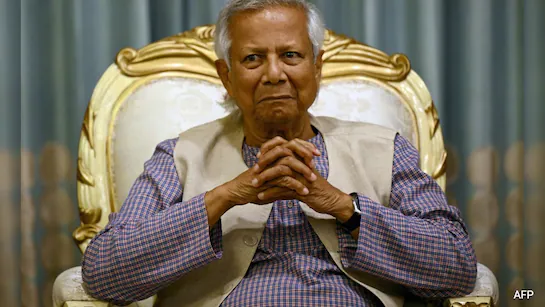DHAKA, May 23: Bangladesh’s interim government chief, Professor Muhammad Yunus, is reportedly considering resignation as the ongoing political deadlock continues to hinder the functioning of the transitional administration. According to a report by the BBC Bangla service published at midnight on Thursday, Yunus is finding it increasingly difficult to operate due to the failure of political parties to reach a common ground.
The revelation came from the chief of the student-led National Citizen Party (NCP), Nhid Islam, who met Yunus earlier in the day to discuss the swirling rumours of his potential resignation.
“We have been hearing news of Sir’s (Yunus) resignation since this morning. So I went to meet Sir to discuss that issue… He said he is thinking about it. He feels that the situation is such that he cannot work,” Islam told BBC Bangla.
Islam further added that Yunus expressed serious concerns about the ongoing situation in the country. “I won’t be able to work unless the political parties can reach a common ground,” Yunus reportedly told him.
The NCP leader, who rose to prominence under Yunus’s informal patronage in February this year, said he urged the Chief Adviser to remain steadfast in his role. “I told him to stay strong for the sake of the country’s security, and future, and to meet the expectations of the mass uprising,” Islam stated. He also expressed hope that political parties would eventually unite and support Yunus in fulfilling his responsibilities. “I hope everyone will cooperate with him,” he said.
However, Islam acknowledged that Yunus’s resignation would be inevitable if the necessary trust and cooperation were absent. “If the political party wants him to resign now… why he will stay if he does not get that place of trust, that place of assurance?” he questioned.
Yunus’s interim administration has faced increasing challenges over the past two days, with one of the most significant being related to Bangladesh’s consolidated military forces. The military played a pivotal role during last year’s student-led uprising that led to the fall of former Prime Minister Sheikh Hasina’s Awami League regime.
Despite being called upon to suppress the protests, the army refrained from launching a crackdown on demonstrators. Instead, it facilitated Hasina’s safe departure to India via an air force aircraft and supported the installation of Muhammad Yunus as the chief adviser—effectively the prime minister—in accordance with the demands of the Students Against Discrimination (SAD). Many SAD members have since merged into the NCP.

